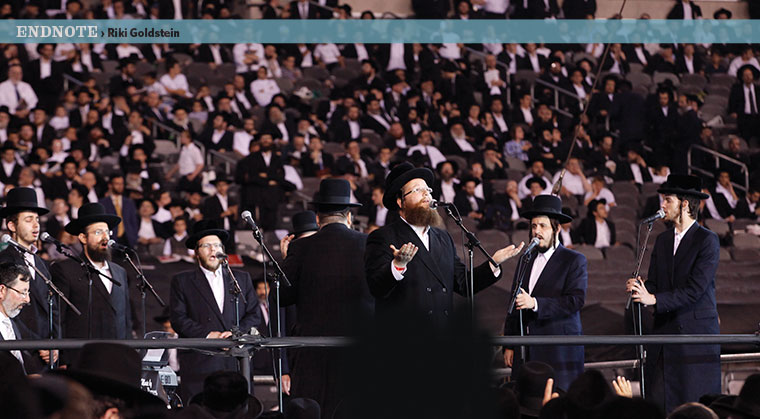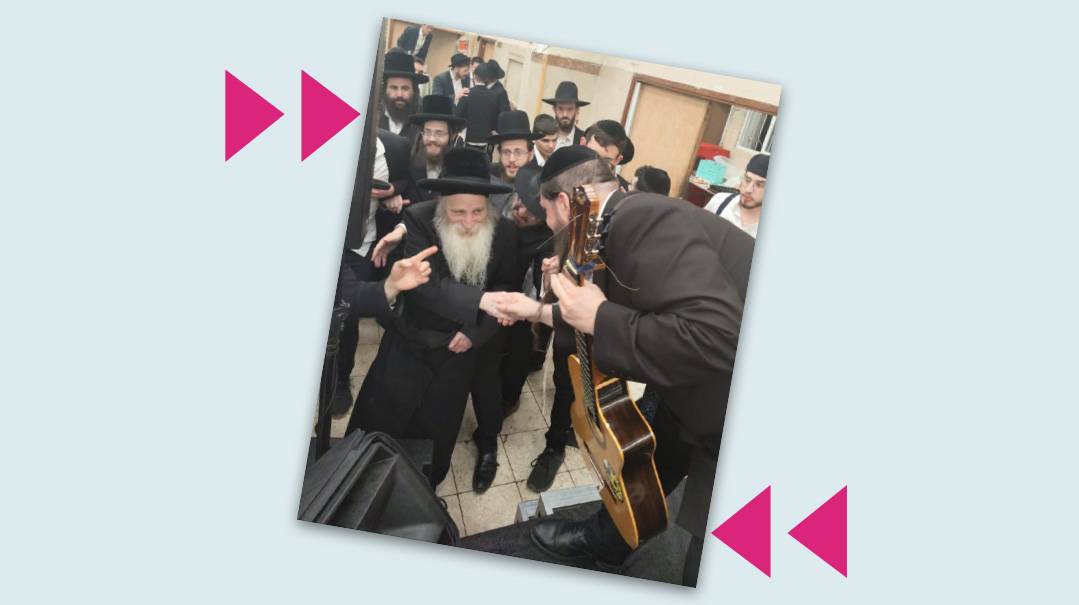A Mother’s Prayer Turns Around a Jewish Daughter
| January 31, 2018
A
Mother’s Prayer Turns Around a Jewish Daughter
Music can definitely return straying sons and daughters to their roots, says singer SHLOIME DASKAL. “A few years ago, I was called by a kallah who wanted me to sing Baruch Levine’s ‘Vezakeini’ at her chuppah. I don’t do only chuppahs, so I took the booking for the whole wedding. But I got stuck in traffic on the way to the hall, which was in Crown Heights, and ran in just in time to sing the chassan down to the chuppah. The kallah soon followed with her parents, and I sang ‘Vezakeini.’ I didn’t have a chance to hear anything about the families, but I’d never seen such an emotional kallah in my life. Later, she thanked me, and she told me that this song had turned her life around. It turns out she grew up on the Upper West Side of Manhattan, but left Yiddishkeit when she grew up. Once on a trip to Israel, she and a friend decided to visit the Kosel, and as the two were sitting there, watching other women daven, they too longed to feel a connection. So her friend took out her phone and looked for songs about Yerushalayim. Sitting there together, they took one earphone each, and the song that came up was Avraham Fried’s ‘Lo Avo BiYerushalayim Shel Matah,’ track number 2 on The New Project Relax, where I did the vocals. ‘Vezakeini’ is track number 1, and something drew them to it — they sat listening to it over and over again, feeling the power of a Jewish mother’s prayer for her children. At that moment, the girl decided to turn back to Yiddishkeit, and that’s why she called me to sing ‘Vezakeini’ at her chuppah — she heard me sing it first as she embarked on the journey.”
The Story Behind the Song
Rabbi Eli Teitelbaum gave ZEVI KAUFMAN the go-ahead for a different kind of music
It was just a few weeks before the sudden petirah of Rabbi Eli Teitelbaum in 2008, that composer Meir Kaufman — who had worked on various projects with Rabbi Teitelbaum including Sdei Chemed and Pirchei IV — took in his teenage son with a collection of new compositions. Singer/songwriter Zevi Kaufman remembers vividly the encouragement he received from Rabbi Teitelbaum, master mechanech and music producer. “We played him a few demos and then my song ‘Akavia,’ which we were unsure about releasing. It’s a little edgy, not your typical traditional melody, and when I wrote it I was thinking of a different kind of audience who also needs chizuk. Rabbi Teitelbaum actually picked up on that one and said, “This is really what people need to hear,” referring to the lyrics taken from the Mishnah in Avos perek 3, which says, “Look at three things and you won’t come to sin….”
Akavia was Zevi Kaufman’s first hit, from his debut album Music Language of My Soul. He subsequently ducked out of the limelight for several years to focus on his learning, but just last last week, Zevi — who now learns in a Jerusalem kollel — returned to the Jewish music arena with the release of a new single called “Ashira,” in honor of Shabbos Shirah.
Those Wacky Words Have Their Source
How many 8TH DAY fans have a hard time getting the catchy lyrics out of their heads even if they have no idea what they mean? Shmuel Marcus says that some of his inspiration comes from just that — phrases that stick in your mind. “I went to Chabad’s Ohr Elchonon yeshivah in Los Angeles, and one year the dorm counselor decided to wake us all up by blaring a Yiddish song with the words ‘Un me’hooleht, un mir gayt a karahot’ — it’s Russian-Yiddish for some types of dances. The word ‘hooleh’ stuck with me and ended up as a title song on our Hooleh album.”
Record Rewards
Remember the JEP records, produced for kiruv and tuition scholarships, whose songs are still around? Back then, they said it couldn’t be done.
JEP, the Jewish Education Program of Agudath Israel of America, began in the early 1970s with volunteers from yeshivos and Bais Yaakovs creating outreach programs for public school and day school children. After one such event, JEP founder Rabbi Mutty Katz told co-founder Yosef Chaim Golding about a boy he’d met with a great voice, which had given him an idea: “Maybe we could make a record with him, and use the proceeds to help pay for children who can’t afford yeshivah tuition?”
Moshe Hauben, Yosef Chaim’s talented chavrusa, agreed to join the effort. Problem was, neither of them had any experience in producing Jewish music, other than for camp color wars. So they gathered friends from different camps — Torah Vodaath, Agudah, Kol-Ree-Nah, and Hadar Hatorah — to compile a bunch of English-language camp hits.
No one in the music business offered much encouragement: “An album of English-language camp songs, no matter how inspiring they sound around a bonfire kumzitz, just won’t make it.” But together with the positive attitude of Yisroel Lamm and the Neginah Orchestra, talented choir director Chaim Schmell, and singers like Heshy Grunberger and Berel Leiner, the JEP album began to take shape.
When “Reach Out” (composed by Rabbi Yaakov Spivak), “Six Million Tears,” and “Dear Nikolai” got air play on the Art Raymond radio show, sales soared, and JEP was not only able to pay back the $5,000 they had borrowed to produce the album, but soon began tallying the profits for the new JEP scholarship fund.
Encore
There was a demand for a JEP 2, so the team got to work, this time joined by Moshe Schmell, Ali Scharf, Rivie Schwebel (who also provided the funding for an upgraded orchestral section), and Rabbi Yonah Weinrib (of Judaica Illuminations fame) who wrote the lead song, “Return, My Children.” The new album still incorporated the genre of original English-language songs, but this time the melodies were familiar: “Times of Joy” to the tune of the ’70’s hit “Ki Lecha Tov Lehodos” and “One Peaceful Friday Night” to “Mikolos Mayim Rabim.” The record didn’t stick to English either — one of its most famous songs was the lively “Se’u Shearim Rasheichem,” which became one of the hits of the decade. Sales topped the first JEP record, boosted in no small measure by the popularity of cassette tapes (and the short-lived 8-tracks, for those who remember).
JEP kept sending kids to yeshivah, and so a third album began, with Bency Schachter and Yossi Sonnenblick joining the team. Once again, Rabbi Yonah Weinrib provided the record’s theme song, “Kol Yisroel Areivim,” and Moshe Hauben composed the energetic “Yom Zeh Mechubad” that’s still popular today. And who can forget the dramatic “Ani Maamin,” replete with a Holocaust-themed narration that ends with the horrifying sound of machine gun fire?
But even “Ani Maamin” couldn’t compete with what would become the most requested song in the history of Mordechai Ben David’s distinguished career: “Someday We Will All Be Together,” the lead song on JEP 4. The JEP producers wanted to top the songs of JEP 3, and so Rabbi Golding reached out to Camp Bnos’s musical director, Dina (Kaluczyner) Storch, who suggested a recently composed cantata song. As soon as they heard it, they knew it was the song they were looking for. Rabbi Golding presented the song to MBD, who slightly adjusted the words and agreed to sing it as a donation to JEP. He had never before sung on someone else’s album, and to this day, he will tell you the song’s massive popularity was because he did it as a 100 percent mitzvah.
One More Round
Rabbi Golding served for many years in a multifaceted career within Agudath Israel of America, and more recently as executive director of RCCS, while Moshe Hauben went on to a career in the acuarial field. But 18 years after JEP 4, — at the urging of the JEP leadership — Moshe, together with Bumy Schachter, agreed to do one more: JEP 5.
JEP talents of the past were joined by the new star power of Dedi, Gershon Veroba, and Dov Levine. They gathered new child soloists and got a boost from radio personality Nachum Segal. They went back to the old genre of original English songs (like the title song “It’s Never Too Late”), and years later, it was a style people were waiting for.
Looking back at over four decades of JEP, the inestimable dividends have been the countless now Torah-observant families who were beneficiaries of JEP’s kiruv efforts. Today there are second and even third generations who can thank all the volunteers who reached out to them through JEP and its records. And the world got some great Jewish songs, too.
(Originally featured in Mishpacha, Issue 696)
Oops! We could not locate your form.






